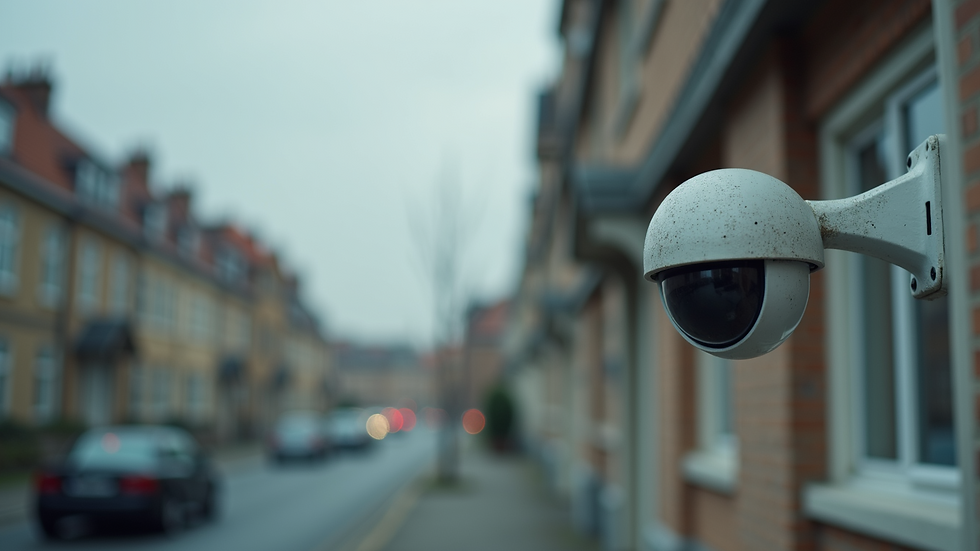Understanding the Importance of Personal Security Measures
- Alex Klenofsky
- Jul 16, 2025
- 4 min read
In an era defined by rapid change and evolving threats, the significance of personal security cannot be overstated. With increasing instances of crime and personal threats, adopting effective personal security measures is essential. This article will explore various aspects of personal security, from simple awareness to advanced protection systems.
Personal Security: Why It Matters
Personal security refers to the measures taken to ensure your safety and well-being. This extends beyond physical safety to emotional and psychological security. The impact of feeling secure is profound; it fosters confidence, enhances personal well-being, and allows individuals to pursue their goals without fear.
Statistics showcase the urgency for personal security. According to the Federal Bureau of Investigation (FBI), the national crime rate in the United States remains a pressing concern. In 2020, property crime alone was estimated around 6.9 million incidents. For individuals, these statistics illustrate the unpredictability of daily life.
Implementing personal security measures can significantly reduce vulnerabilities. These preventative steps provide a layer of protection against various threats, including theft, assault, and stalking. By prioritizing personal security, individuals can lead a more peaceful life.

Practical Steps for Enhancing Personal Security
Building a solid foundation for personal security involves taking actionable steps. Here are several effective strategies:
Stay Aware of Your Environment: Always be vigilant about your surroundings. Pay attention to unusual behavior, and avoid distractions such as interacting with your phone while walking in public spaces.
Invest in Security Systems: Simple measures like installing a security camera system at home can deter potential threats. Modern systems, equipped with motion sensors and night vision, offer 24/7 protection.
Secure Entry Points: Ensure all doors and windows are secured with reliable locks. Use deadbolts for added security.
Manage Personal Information: Be conscious of the information you share online. Limit sharing personal details on social media and adjust privacy settings on your accounts.
Have an Emergency Plan: Prepare an action plan in the event of a security threat. This plan should include safe locations, emergency contacts, and routes of escape.
Consider Professional Help: For those at high risk or in need of extensive protection, professional services offer tailored solutions. Companies that provide executive protection services can offer comprehensive safety plans.

What is the Difference Between an Executive Protection Agent and a Bodyguard?
When exploring personal security options, the terms "executive protection agent" and "bodyguard" often arise. While they share similarities, their roles are distinct.
An executive protection agent generally provides a higher level of personal security for individuals, particularly in high-stress environments such as corporate settings. These agents typically possess specialized training in risk assessment, evasive driving, and threat management. They often work with individuals who hold significant public profiles, such as celebrities, politicians, or corporate executives.
Conversely, a bodyguard provides physical protection, often focusing on the immediate safety of an individual. While bodyguards may possess impressive physical abilities and combative skills, they may not have the extensive training in crisis management that executive protection agents receive.
Therefore, the choice between hiring an executive protection agent or a bodyguard largely depends on the specific needs of the individual requiring protection.

Building a Personal Safety Network
Creating a safety network can significantly enhance personal security. This network should consist of friends, family, neighbors, or co-workers who can look out for each other. Here are some ways to build your personal safety network:
Establish Trust: Begin by discussing safety concerns with people you trust. This dialogue can lay the foundation for a supportive community.
Share Information: Regularly update your network about your whereabouts and share personal safety tips. Knowledge is power; the more everyone knows, the safer you all can be.
Combine Resources: Pool together resources, such as surveillance camera footage, alarm systems, or emergency plans. A collective approach can enhance security for all involved.
Participate in Community Programs: Engage in local safety programs or neighborhood watch initiatives. These programs often foster community awareness and cohesion, improving overall safety.
Use Technology: Applications are available that can enhance safety network communication. For example, location-sharing apps can keep friends and family informed about your location during potentially dangerous situations.
Understanding the Psychological Aspects of Personal Security
Personal security is not only about physical measures; mental well-being plays a crucial role too. The constant fear of insecurity can lead to stress, anxiety, and other mental health issues. Here’s how to manage psychological impacts effectively:
Educate Yourself: Understanding potential risks empowers individuals. When you are informed about safety strategies, you can take steps to mitigate risks effectively.
Address Anxiety: Recognize that it is normal to feel anxious about personal safety. Practice techniques to manage anxiety, such as meditation or breathing exercises.
Seek Professional Guidance: If fear becomes overwhelming, seeking help from a mental health professional could provide valuable coping strategies.
Stay Connected: Engage with your support system regularly to talk about fears and concerns. This connection often provides relief and reassurance.
Keep Learning: Stay updated on personal security trends. Technology and threats are ever-evolving, and being informed can reduce feelings of vulnerability.
Taking Personal Accountability for Safety
Ultimately, personal security is about taking responsibility for your own safety. While professionals can provide assistance, individuals must adopt a proactive mindset. Here are essential tips for maintaining personal accountability:
Regularly Review Security Measures: Make it a habit to evaluate the effectiveness of your security measures regularly. Adapt and change as necessary based on new threats.
Practice Good Habits: Simple habits, such as locking your car door and avoiding poorly lit areas, can significantly enhance personal safety.
Educate Others: Share knowledge about personal security with friends and family. Empowering others can build a safer community overall.
Trust Your Instincts: If something feels off, trust your gut. Acting on intuition can sometimes prevent dangerous situations.
Stay Engaged with Current Events: Being aware of local crime trends and safety issues can guide your response to potential dangers.
In conclusion, personal security measures extend beyond physical protection. Elevating awareness, staying informed, and fostering supportive communities significantly contributes to individual and collective safety. Whether it’s through investing in security systems or leveraging professional services, making personal security a priority can help you live confidently and peacefully.





Comments